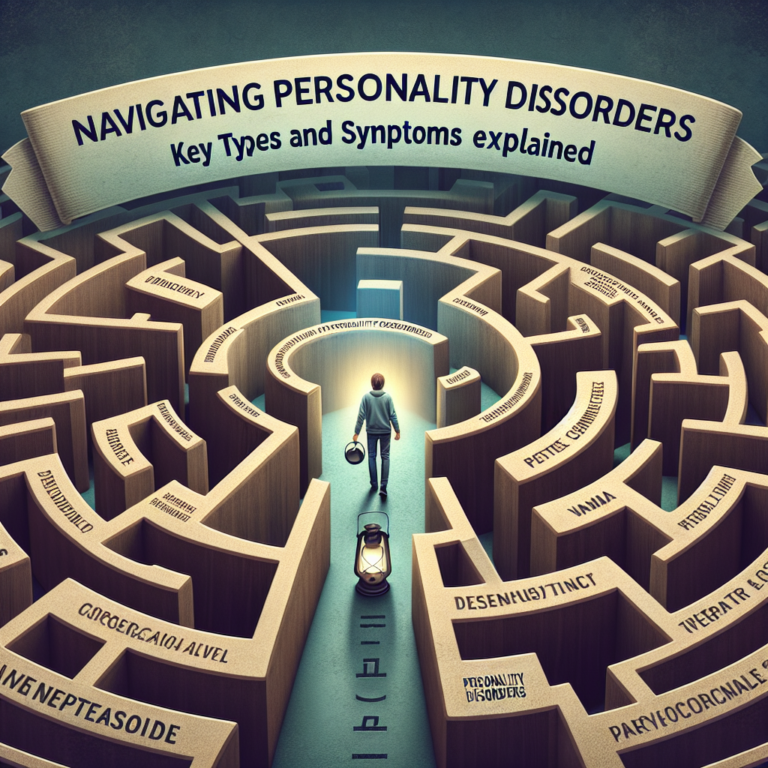The Psychology of Nutrition: Can a Good Diet Improve Your Mental State? The Ultimate Guide to Nourishing Your Mind
Introduction
Have you ever had a day when you felt completely invigorated, ready to tackle anything, only to be followed by a day of lethargy and foggy thinking? Did you ever stop to consider that what you ate might be influencing your mental state? The intersection of diet and psychological well-being has garnered increasing attention in recent years, raising the critical question: The Psychology of Nutrition: Can a Good Diet Improve Your Mental State?
Understanding the complex relationship between our daily intake and our mental health can empower us to make informed dietary choices that promote not just bodily health but also cognitive and emotional resilience. In this article, we will explore the multifaceted ways in which nutrition impacts mental well-being, backed by scientific research, engaging case studies, and actionable insights.
Why Nutrition Matters for Mental Health
The human brain is a complex organ that relies heavily on the nutrients we consume. Nutritional psychiatry is an emerging field, emphasizing the role of diet in mental health. Research reveals that specific nutrients can bolster mood, reduce anxiety, and even decrease the risk of depression. The question, therefore, isn’t just whether diet affects the mind, but rather—how deeply does it influence our psychological state?
Nutrients and Their Psychological Benefits
Macronutrients and Mood
Carbohydrates
- Function: Provide energy and serotonin synthesis.
- Effects: A diet high in refined carbohydrates can lead to fluctuating blood sugar levels, impacting mood stability.
- Insight: Complex carbohydrates (like whole grains) release glucose more slowly, fostering a steady energy supply.
Proteins
- Function: Building blocks for neurotransmitters.
- Effects: Low protein intake can lead to neurotransmitter deficiencies, affecting mood regulation.
- Insight: Adequate protein intake, particularly tryptophan-rich foods (like turkey), may aid serotonin production.
- Fats
- Function: Essential for brain health.
- Effects: Omega-3 fatty acids have been linked to reduced symptoms of depression and anxiety.
- Insight: Including fish, walnuts, and flaxseeds can enhance overall mental health.
Micronutrients and Their Role
- Vitamins and Minerals
- Vitamin D: Low levels are correlated with depressive symptoms.
- Magnesium: Acts as a natural relaxant and is crucial for mood regulation.
- Zinc: Linked to improved mood and cognitive function.
Case Study: The Mediterranean Diet and Mental Health
A recent study conducted in a Mediterranean region investigated the effects of a traditional Mediterranean diet, rich in fruits, vegetables, whole grains, and healthy fats, on the mental health of its residents. Researchers found a significant reduction in depressive symptoms among those adhering closely to this diet.
Analysis: This study illustrates the potential of a wholesome, nutrient-dense diet to foster mental well-being, suggesting that lifestyle interventions could be as critical as pharmacological treatments.
The Gut-Brain Connection
Understanding the Microbiome
The gut microbiome houses trillions of bacteria and plays a crucial role in modulating brain function and mental health. Recent studies have shown that a healthy microbiome can affect the production of neurotransmitters, including serotonin, which is often referred to as the “happiness hormone.”
Key Findings:
- A diet rich in fiber supports a diverse and beneficial gut microbiome.
- Probiotic foods (like yogurt and fermented vegetables) can enhance gut health and potentially improve mood.
Case Study: Diet and Anxiety in Adolescents
A study focused on adolescents found a direct relationship between diet quality and anxiety levels. Those who consumed a high-fiber, varied diet had lower reported levels of anxiety.
Analysis: This finding emphasizes the importance of dietary choices in younger populations, who might be particularly vulnerable to mood disorders.
The Role of Sugar and Processed Foods
The Dark Side of Poor Nutrition
A diet high in sugar and processed foods can lead to inflammation and insulin resistance, negatively affecting brain function. In essence, these poor nutritional choices can manifest as mood swings, irritability, and increased anxiety levels.
Case Study: Sugar and Depression
Research has indicated that individuals consuming high levels of sugar are more likely to experience depressive symptoms. In a survey of over 5,000 participants, those who consumed sugary drinks more than four times a week had a 30% increased chance of developing depression.
Analysis: This study serves as a cautionary tale about the psychological effects of dietary choices, reinforcing that sugar may not just affect our waistlines but also our mental well-being.
The Impact of Diet on Cognitive Function
Memory, Focus, and Attention
Research has demonstrated that diet has a significant effect on cognitive processes, including memory and attention. Nutrients vital for brain function, such as antioxidants and omega-3 fatty acids, can enhance learning and memory retention.
Case Study: Impact on Elderly Cognitive Health
A longitudinal study examined the diets of older adults and their cognitive health over a decade. Participants adhering to diets rich in fruits, vegetables, fish, and nuts showed slower cognitive decline compared to those with poorer diets.
Analysis: This emphasizes the potential of a good diet, particularly in aging populations, to preserve cognitive functions and facilitate mental state longevity.
Food Environments and Mental Well-Being
Accessibility and Choices
The availability of healthy foods in our environments plays a crucial role in dietary choices. Food deserts—areas with limited access to nutritious food—negatively affect mental health outcomes.
Case Study: Urban Food Deserts
Research into urban neighborhoods revealed that residents in food deserts experienced higher rates of depression and anxiety. By improving food accessibility through community gardens and local markets, the psychological health of these communities showed notable improvement.
Analysis: This underscores the broader societal implications of nutrition and mental health, indicating that systemic changes can positively impact collective mental states.
Practical Steps Towards a Better Diet for Mental Health
Actionable Insights
- Incorporate Variety: Aim for a colorful plate filled with fruits and vegetables.
- Limit Sugar: Replace sugary snacks with nuts, fruits, and other whole foods.
- Stay Hydrated: Dehydration can affect mood; aim for adequate water intake.
- Mindful Eating: Practice being present during meals to appreciate the nutritional benefits and foster better digestion.
Conclusion
As we’ve explored throughout this article, the intricate relationship between diet and mental health raises the compelling question: The Psychology of Nutrition: Can a Good Diet Improve Your Mental State? The evidence points toward a resounding "yes." By embracing nutrient-rich foods and understanding their psychological impacts, we can enhance our mental well-being and live more satisfying lives.
FAQs Section
Can dietary changes really affect my mood?
- Yes, research indicates that dietary choices can significantly impact mood, anxiety levels, and overall mental health.
What is the best diet for mental health?
- Diets rich in whole foods, including fruits, vegetables, whole grains, and healthy fats (like the Mediterranean diet), are beneficial for mental health.
Are there specific foods that help reduce anxiety?
- Foods high in omega-3 fatty acids, antioxidants, and vitamins (like fatty fish, berries, and leafy greens) can help reduce anxiety symptoms.
How long does it take to see improvements in mental health from dietary changes?
- While individuals may experience changes within weeks, lasting effects will depend on sustained dietary improvements and individual factors.
- Is there a downside to healthy eating?
- A sudden switch to a drastically restrictive diet can lead to stress and anxiety around food. It’s best to make gradual, balanced changes.
This guide combined understanding of nutritional science with practical tips, making it significant not just for those interested in diet, but also for anyone seeking to improve their mental state. Embrace the journey towards improved mental health through thoughtful and nutritious eating!












Hi there, You have done a fantastic job. I will certainly digg it and personally suggest to my friends. I’m sure they will be benefited from this website.
Some truly interesting info , well written and broadly speaking user friendly.
Very interesting topic, thanks for posting.
Good article and straight to the point. I am not sure if this is in fact the best place to ask but do you guys have any thoughts on where to hire some professional writers? Thanks 🙂
We stumbled over here coming from a different page and thought I may as well check things out. I like what I see so i am just following you. Look forward to checking out your web page again.
Good post however I was wanting to know if you could write a litte more on this subject? I’d be very grateful if you could elaborate a little bit further. Bless you!
Glad to be one of several visitors on this amazing site : D.
I love your blog.. very nice colors & theme. Did you create this website yourself? Plz reply back as I’m looking to create my own blog and would like to know wheere u got this from. thanks
I have been exploring for a bit for any high-quality articles or blog posts on this sort of area . Exploring in Yahoo I at last stumbled upon this site. Reading this information So i am happy to convey that I’ve an incredibly good uncanny feeling I discovered just what I needed. I most certainly will make sure to don’t forget this web site and give it a look on a constant basis.
When I originally commented I clicked the -Notify me when new comments are added- checkbox and now each time a comment is added I get four emails with the same comment. Is there any way you can remove me from that service? Thanks!
Whats up very nice web site!! Guy .. Excellent .. Superb .. I’ll bookmark your site and take the feeds additionallyKI am satisfied to seek out numerous useful info right here within the publish, we need work out extra techniques in this regard, thanks for sharing. . . . . .
Awesome blog! Is your theme custom made or did you download it from somewhere? A theme like yours with a few simple adjustements would really make my blog shine. Please let me know where you got your theme. With thanks
I’d should check with you here. Which is not something I often do! I take pleasure in reading a submit that may make individuals think. Also, thanks for permitting me to remark!
Write more, thats all I have to say. Literally, it seems as though you relied on the video to make your point. You clearly know what youre talking about, why throw away your intelligence on just posting videos to your site when you could be giving us something informative to read?
I am not real excellent with English but I line up this real easy to interpret.
Woh I enjoy your posts, saved to fav! .
I’m not sure exactly why but this site is loading very slow for me. Is anyone else having this issue or is it a issue on my end? I’ll check back later on and see if the problem still exists.
There is noticeably a bundle to know about this. I assume you made certain nice points in features also.
Pretty component to content. I simply stumbled upon your weblog and in accession capital to say that I acquire actually enjoyed account your blog posts. Anyway I will be subscribing in your augment and even I achievement you get entry to consistently quickly.
I really appreciate this post. I’ve been looking all over for this! Thank goodness I found it on Bing. You have made my day! Thanks again!
My spouse and i have been now more than happy that Jordan could finish up his preliminary research through the precious recommendations he grabbed through the weblog. It’s not at all simplistic to simply find yourself giving for free hints that other folks might have been making money from. We really see we need the writer to thank because of that. The illustrations you have made, the simple blog navigation, the friendships you can give support to promote – it’s mostly overwhelming, and it’s helping our son and our family reason why that theme is awesome, and that’s wonderfully essential. Many thanks for everything!
You really make it appear so easy along with your presentation however I find this topic to be actually one thing which I believe I would never understand. It seems too complex and very huge for me. I’m having a look ahead on your subsequent submit, I?¦ll try to get the grasp of it!
Howdy! Do you know if they make any plugins to help with SEO? I’m trying to get my blog to rank for some targeted keywords but I’m not seeing very good success. If you know of any please share. Thank you!
I was very pleased to find this web-site.I wanted to thanks for your time for this wonderful read!! I definitely enjoying every little bit of it and I have you bookmarked to check out new stuff you blog post.
I like this blog its a master peace ! Glad I found this on google .
When I originally commented I clicked the -Notify me when new comments are added- checkbox and now each time a comment is added I get four emails with the same comment. Is there any way you can remove me from that service? Thanks!
I am thankful that I discovered this website, just the right info that I was searching for! .
Hi, Neat post. There is a problem along with your site in internet explorer, would check thisK IE still is the market leader and a good section of other people will miss your great writing due to this problem.
Hello! I could have sworn I’ve been to this blog before but after browsing through some of the post I realized it’s new to me. Anyways, I’m definitely happy I found it and I’ll be book-marking and checking back frequently!
It’s truly a nice and helpful piece of information. I’m glad that you just shared this useful information with us. Please stay us up to date like this. Thank you for sharing.
Great – I should certainly pronounce, impressed with your site. I had no trouble navigating through all the tabs as well as related information ended up being truly easy to do to access. I recently found what I hoped for before you know it in the least. Reasonably unusual. Is likely to appreciate it for those who add forums or anything, site theme . a tones way for your customer to communicate. Excellent task.
You really make it appear really easy with your presentation but I to find this topic to be really something which I think I would never understand. It seems too complex and very vast for me. I’m looking ahead on your next put up, I will attempt to get the cling of it!
Excellent post. I was checking constantly this blog and I’m impressed! Extremely helpful information particularly the last part 🙂 I care for such information much. I was seeking this certain information for a long time. Thank you and good luck.
As a Newbie, I am permanently exploring online for articles that can benefit me. Thank you
Its such as you read my thoughts! You appear to grasp so much about this, like you wrote the book in it or something. I believe that you could do with some percent to power the message house a little bit, but other than that, that is fantastic blog. A fantastic read. I will certainly be back.
I’ve recently started a web site, the information you offer on this web site has helped me greatly. Thanks for all of your time & work. “My dear and old country, here we are once again together faced with a heavy trial.” by Charles De Gaulle.
I have been reading out some of your posts and it’s pretty nice stuff. I will definitely bookmark your website.
Hi, i think that i noticed you visited my website so i came to “go back the prefer”.I’m attempting to in finding issues to improve my site!I guess its adequate to use a few of your ideas!!
You are my inhalation, I possess few web logs and rarely run out from post :). “Yet do I fear thy nature It is too full o’ the milk of human kindness.” by William Shakespeare.
This actually answered my drawback, thanks!
Thank you, I have just been searching for info about this subject for a while and yours is the best I have found out so far. However, what about the bottom line? Are you sure in regards to the source?
I was recommended this web site by my cousin. I am not sure whether this post is written by him as nobody else know such detailed about my problem. You’re amazing! Thanks!
Very good written story. It will be helpful to anyone who employess it, including myself. Keep doing what you are doing – for sure i will check out more posts.
Hey! Do you use Twitter? I’d like to follow you if that would be okay. I’m absolutely enjoying your blog and look forward to new posts.
Hi, Neat post. There’s a problem with your site in internet explorer, would test this… IE still is the market leader and a good portion of people will miss your fantastic writing due to this problem.
I like this weblog so much, saved to favorites.
Great site. Plenty of useful info here. I’m sending it to some friends ans also sharing in delicious. And certainly, thanks for your sweat!
Hi there, I found your blog via Google while looking for a related topic, your website came up, it looks good. I have bookmarked it in my google bookmarks.
Hello.This article was extremely motivating, particularly since I was searching for thoughts on this subject last Friday.
It’s laborious to find knowledgeable folks on this subject, but you sound like you already know what you’re talking about! Thanks
After study a few of the blog posts on your website now, and I truly like your way of blogging. I bookmarked it to my bookmark website list and will be checking back soon. Pls check out my web site as well and let me know what you think.
Some truly interesting info , well written and broadly user pleasant.
I keep listening to the news broadcast lecture about receiving free online grant applications so I have been looking around for the best site to get one. Could you tell me please, where could i acquire some?
Regards for this post, I am a big fan of this site would like to continue updated.
Some genuinely superb information, Gladiola I observed this. “I try to avoid looking forward or backward, and try to keep looking upward.” by Charlotte Bronte.
Hi there, You’ve done an excellent job. I will certainly digg it and in my opinion suggest to my friends. I am sure they will be benefited from this web site.
hi!,I like your writing very much! share we communicate more about your article on AOL? I need a specialist on this area to solve my problem. Maybe that’s you! Looking forward to see you.
Admiring the time and effort you put into your website and in depth information you offer. It’s good to come across a blog every once in a while that isn’t the same unwanted rehashed material. Excellent read! I’ve saved your site and I’m adding your RSS feeds to my Google account.
Hey! I know this is somewhat off topic but I was wondering if you knew where I could get a captcha plugin for my comment form? I’m using the same blog platform as yours and I’m having trouble finding one? Thanks a lot!
I have not checked in here for some time since I thought it was getting boring, but the last several posts are great quality so I guess I will add you back to my daily bloglist. You deserve it my friend 🙂
I very pleased to find this internet site on bing, just what I was looking for : D as well saved to bookmarks.